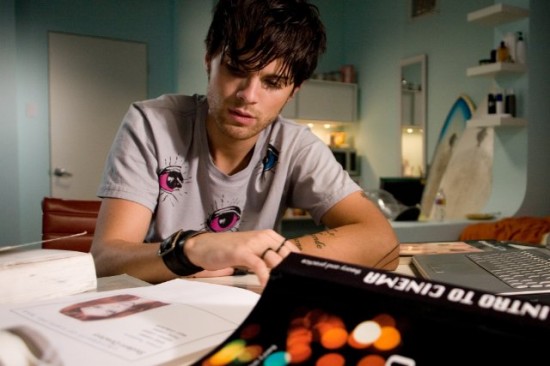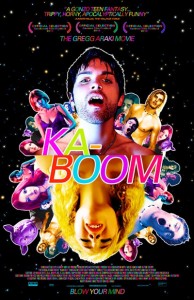
You have to be looking for the extreme possibilities of weirdness and even then it might be too garish and exhausting to take. Gregg Araki’s Kaboom isn’t bizarre, it’s bizarro. This hallucinogenic and sexually experimental college-set movie features a hero who has undeclared his sexual preference so he sleeps anonymously with boys and girls. His curiosity is truly met when his girlfriend sets up a three-way with another guy. Plot additions include witches, men in animal masks, a secret underground society ahead of world administration (what does this mean?), a missing red-head girl, a mysterious video with cult rituals blindfolding victims and doing unexplained things to them, and one voodoo doll.
Our pansexual hero Smith (Thomas Dekker) has such a wandering imagination that he is less than reliable as a subjective protagonist. Upon the first crucial scenes at a college bash he bites into a hallucinogenic cookie. Cute-punkish London (Juno Temple) tows him to bed and they have sex while the visuals go through a kaleidoscopic whirl. And when he heads home later that evening and encounters weird animal masked men abducting a red-head girl, he might still be tripping. His best friend Stella (Haley Bennett) from childhood is willing to listen to his outlandish claims because she is going through a weird lesbian relationship with witch Lorelei (Roxane Mesquida) who has paranormal powers.
On account of a constantly changing and fractured narrative, we are able to guess whether Smith is a schizophrenic with an imagination off the deep end or if whether all this bizarre stuff is really happening in this anything-goes movie. In the same approach, we wonder if Smith is insane or if filmmaker Greg Araki is truly insane. But if you have ever seen his deeply moving film about child molestation called “Mysterious Skin” (2005) you know that he is not , and that his far-flung swings in mood and Andy Warhol-like lighting is not ineptitude, just part of his crazy, anarchic spirit.
In the press notes, Araki discusses the work of David Lynch and particularly his early ’90’s TV series “Twin Peaks.” He explains that his film “aspires to that show’s free spirit – unfettered by the restraints and demands of the commercial marketplace” and says something too about free art “vibrating at its own anomalous frequency.” Lynch, the king of post-modern avante-garde, has in addition to getting inside the mind-altering schisms of characters in fugue state, has made films rich and potent in allegorical meaning such as “Eraserhead” (1977) and “Mulholland Drive” (2001). And then Lynch has made films like “Lost Highway” (1997) which are compacted weirdness in a box that don’t owe much to great analysis – a film like that is an ephemeral mood that is entrancing while you watch it, but meaningless afterwards. In that sense, “Kaboom” follows Lost Highway.”
You can’t look at Araki’s movie and say that this is anything like the way a college looks, or the way dorm rooms look. This is acid memory of what college campuses and dorm rooms look like. The movie takes its time to get where it is going, not because Smith is self-doubting, but because he gets sidetracked in sex scenes. But then the ominous menace (the secret society and the men in animal masks, likely interrelated) gets closer to him which heightens the urgency. Except that it always seems like his friends are the ones under threat, and that it’s never him. Kelly Lynch plays his mom back home who couldn’t care less about her son’s anxieties (the dad has been dead a longtime, but wait, he turns up in Smith’s visions). This is Southern California family superficiality at its most uncaring and vacuous.
In the film’s penultimate final shot, the largest thing you could think of goes Kaboom! and it’s a special effect so cheesy that you can’t help but go into hysterics over it. If you have a strong curiosity for the weird, the bad, and the ugly you might be one of the few that will want to stay tuned.
88 Minutes. Unrated.
SCI-FI & FANTASY / WEIRDNESS / FRIDAY AFTER DARK
Film Cousins: “Eraserhead” (1977); “The Apple” (1980); “Lost Highway” (1997); “The Box” (2009).





